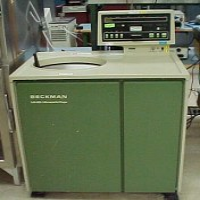Constant Acceleration Testing
The constant acceleration test is performed to simulate the effects of acceleration on microelectronic devices. This microelectronic centrifuge test indicates types of mechanical and structural weaknesses not necessarily detected in vibration or mechanical shock testing. It’s a high-stress test used to determine the mechanical limits of a package and other elements such as the internal metallization and lead system, the attachment of its die or substrate, and the robustness of its wire bonds. Oneida Research Services offers constant acceleration to 50,000g.
At lower, non-destructive levels of stress settings, centrifuge testing may also be utilized as a 100% in-line screen to detect and eliminate packages that exhibit lower than nominal mechanical strengths in any of their structural elements. While constant acceleration is most often performed in only the Y1 direction, the requirements may specify the g-force to be applied to each of the package’s six orientations. For packages with internal elements mounted with the major plane perpendicular to the Y axis, the Y1 orientation is defined as the one that tends to displace the elements from their mount.
Suitability and Accreditation
Oneida Research Services achieved Commercial Laboratory Suitability Status for MIL-STD-883, Method 2001, constant acceleration testing through Defense Logistics Agency (DLA).




